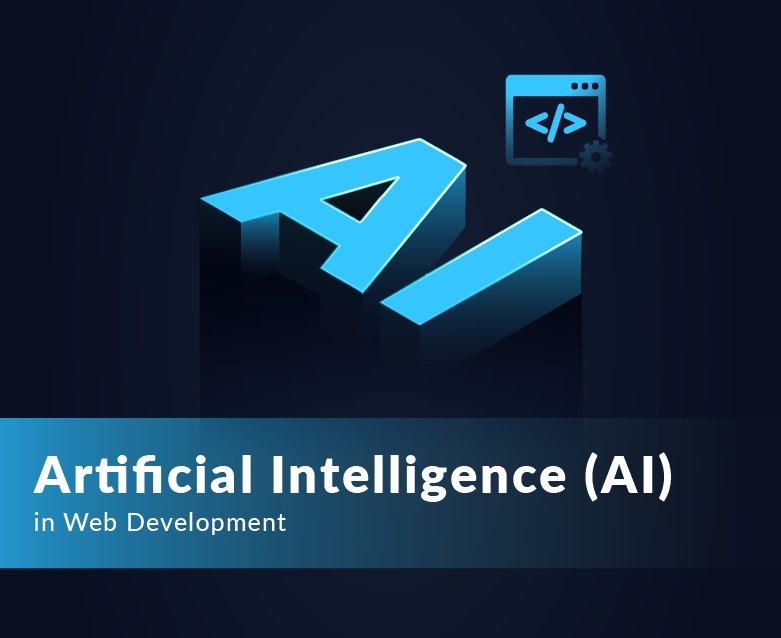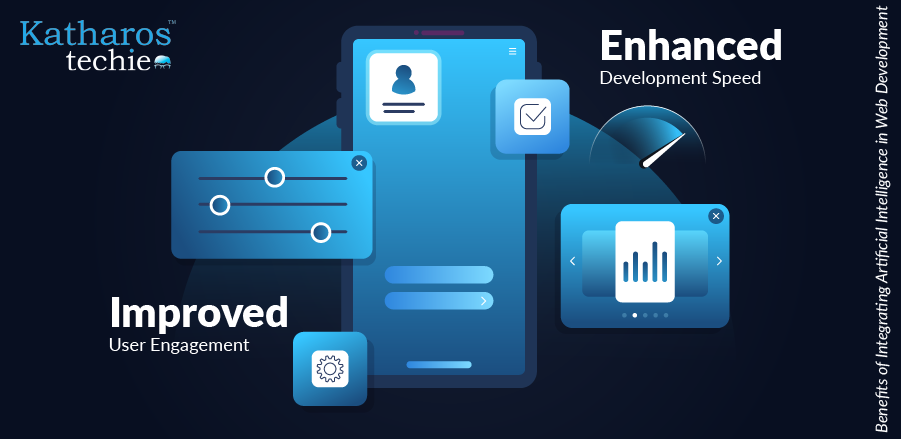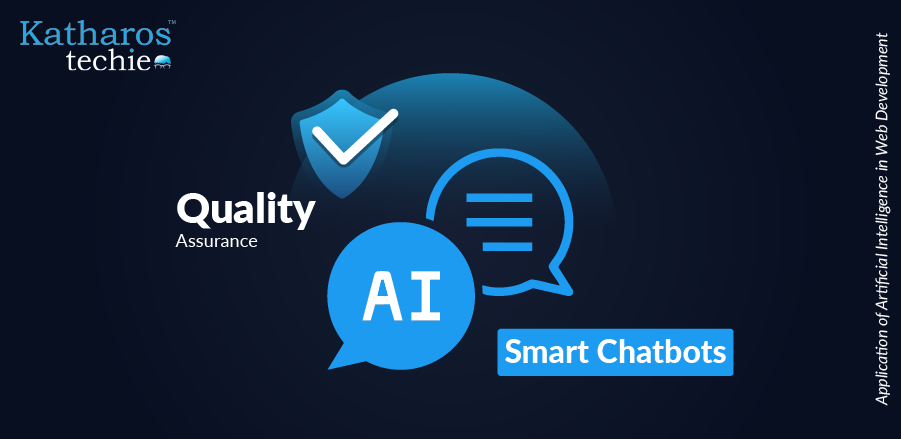
Artificial Intelligence in Web Development
By Ankita Das

Artificial Intelligence in web development significantly enhances developers’ productivity and skill sets by automating mundane tasks. This allows developers to focus on more complex and creative aspects of their projects, ultimately improving efficiency. In fact, according to a report by McKinsey, automation can boost global productivity growth by 0.8% to 1.4% annually, demonstrating the substantial impact of AI on workflow and project outcomes.
Beyond boosting developer efficiency, AI integration benefits web development through personalized content delivery, improved user experiences, and data-driven insights. For instance, platforms like Unicorn use AI to automate design processes and optimize user engagement. Companies like Shopify leverage AI for personalized product recommendations, significantly boosting sales.
Encouraging AI usage in web development enables companies to stay competitive by delivering unique user experiences and streamlining operations. In this article, we’ll look at the benefits of Artificial Intelligence in web development, best practices, and potential challenges that programmers may encounter. But first, let’s delve into the role of Artificial Intelligence (AI) in Web Development.
Role of Artificial Intelligence in Web Development
AI revolutionizes web development by improving security, streamlining decision-making, managing content effectively, and personalizing user experiences. These technologies enable developers to automate repetitive tasks, enhancing productivity and allowing focus on more complex project aspects. For instance, AI-driven platforms can analyze user behavior to deliver tailored content and product recommendations. Thus, increasing user engagement and conversion rates. According to research, personalization can lead to a 20% increase in sales.
The importance of AI in website development extends to implementing a data-driven strategy that utilizes automation and A/B testing. Businesses can personalize their websites by embracing user-centric design to improve user experiences and enhance conversion rates. For example, companies like Amazon leverage AI for personalized product recommendations, boosting 35% of its total sales.
Furthermore, AI enhances security by detecting potential threats in real-time and safeguarding sensitive data from cyberattacks. As the market value for AI is projected to reach $10.44 billion by 2027, integrating these technologies into web development is beneficial and essential for staying competitive in the digital landscape.
Benefits of Integrating Artificial Intelligence in Web Development

Integrating Artificial Intelligence (AI) in web development offers numerous benefits that enhance both the development process and user experience. Here’s a closer look at some key advantages:
1. Better UI Visual Design
AI significantly improves website design by automating the creation of visually appealing layouts. With AI-driven design tools, developers can analyze user behavior and preferences to suggest design elements that resonate with target audiences. This approach enhances the website’s aesthetic appeal and significantly boosts user satisfaction. Research shows that 75% of users evaluate a company’s credibility based on its website design. This data underscores the critical role that visual elements play in shaping perceptions.
2. Enhanced Development Speed
AI accelerates the web development process, enabling faster time-to-market. AI tools streamline workflows and reduce manual effort by automating routine tasks such as code generation and bug detection. This efficiency enables development teams to concentrate on strategic tasks, resulting in faster project completion and a competitive advantage. Additionally, teams can contribute more time to innovation and creativity which are essential for staying ahead in the market.
3. High-Quality Content Creation
According to Gartner, AI will generate 30% of digital content by 2025. This advancement enables AI tools to craft engaging content that aligns seamlessly with brand voice. By automating content creation, businesses can save time and ensure that their messaging resonates effectively with their target audiences, ultimately driving higher engagement and conversion rates. This capability also enhances the quality of marketing materials, making them more effective in attracting and converting visitors.
4. Improved User Engagement
AI enhances user engagement by delivering personalized experiences tailored to individual preferences. Algorithms analyze user interactions to provide relevant content and recommendations, increasing the likelihood of conversions. For instance, AI-driven chatbots offer immediate assistance, guiding users through their journey. This fosters a sense of appreciation that keeps them coming back.
5. Web Performance Optimization
Artificial Intelligence (AI) in web development is crucial in optimizing website performance. It works by ensuring fast load times and smooth navigation. With 53% of mobile users abandoning sites that take longer than three seconds to load, AI analyzes various metrics to improve performance. By adjusting server settings and compressing images, AI ensures websites run efficiently across all devices, positively impacting search engine rankings and user retention.
Now that we have explored the numerous benefits of AI in web development, it’s time to delve into its practical applications. Understanding how AI can be effectively implemented allows businesses to harness its full potential. This transformation impacts how websites are built and how users interact with them.
Leveraging AI in Web Development: Transformative Tools and Techniques

Artificial Intelligence (AI) transforms web development by providing innovative tools that streamline processes, enhance user experiences, and optimize performance. Developers can harness AI technologies across various aspects of web development, from automating website creation with Artificial Design Intelligence (ADI) to improving user interaction through smart chatbots. By integrating these advanced solutions, developers can increase efficiency and create more personalized and engaging online user experiences. Here are some key areas where AI can be effectively utilized:
1. Content Generation
AI tools can help generate high-quality content quickly, saving time for marketers and developers alike. For instance, Copy.ai uses natural language processing to create engaging copy based on user prompts or existing content themes. This capability allows businesses to maintain a consistent online presence while reducing the workload on human writers, potentially increasing content output by 40%.
2. Artificial Design Intelligence (ADI)
Artificial Design Intelligence automates the creation of fully functional websites, covering aesthetics, structure, and content. By asking users simple questions, ADI can create customized websites that align with their unique needs and preferences. For example, Zyro’s ADI utilizes data from millions of users to create unique sites based on user inputs, allowing for easy customization and ensuring that the final product aligns with the user’s vision.
3. Coding Assistants
AI coding assistants help developers write code more efficiently by suggesting code snippets or completing lines based on context. Tools like Tabnine utilize machine learning to predict the next line of code a developer may need, enhancing productivity. According to a Stack Overflow survey, 76% of developers reported using AI coding assistants, which can reduce coding time by approximately 55% when integrated effectively into workflows.
4. Automated Testing and Quality Assurance
Automated testing powered by AI enhances the quality assurance process by quickly identifying bugs and vulnerabilities in website code. Tools like Test.ai leverage machine learning to run tests automatically, adapting to changes in the codebase with minimal human intervention. This automation can lead to a 70% reduction in testing time, allowing developers to focus on more complex issues while ensuring high-quality deliverables.
5. Improved Security Measures
AI enhances website security by identifying threats through real-time monitoring and anomaly detection. Solutions like Darktrace utilize machine learning algorithms to detect unusual patterns that may indicate cyber threats, enabling proactive measures against attacks. Organizations employing AI-driven security solutions can reduce incident response time by up to 90%, significantly mitigating risks.
6. Enhanced Search Engine Optimization (SEO)
AI streamlines the SEO process by analyzing data to recommend the best keywords and content strategies. For example, MarketMuse uses AI to analyze content performance and recommend topics to improve search engine rankings. This tool generates headlines and provides insights into keyword density and competitor analysis, helping users create high-performing content more efficiently.
7. Website Performance Optimization
AI plays a crucial role in optimizing website performance by analyzing user behavior and site metrics to identify areas for improvement. Tools like Google PageSpeed Insights use AI algorithms to assess load times and suggest optimizations such as image compression or code minification. Websites optimized with AI can see up to a 50% reduction in load times, significantly enhancing user experience and retention rates.
8. Predictive Analytics for User Behavior
AI enables predictive analytics that helps businesses understand user behavior patterns and anticipate future actions. By analyzing historical data, AI tools like Mixpanel can identify trends and provide actionable insights that inform marketing strategies and website design decisions. This capability allows companies to tailor their offerings more effectively, leading to increased conversion rates.
9. Smart Chatbots for Personalized User Experience
AI-powered chatbots significantly enhance user interaction by providing instant answers to queries without manual searching. These bots can understand natural language and respond accordingly, improving customer satisfaction. Drift’s chatbot, for instance, integrates seamlessly into websites to assist users in real-time, effectively handling basic inquiries and freeing up human agents for more complex issues. This approach can lead to a 30% increase in user engagement.
This wraps up the key applications of AI in web development. However, just understanding the applications is not enough. We must understand the potential challenges and limitations of integrating AI technologies. Addressing these challenges is crucial for ensuring successful implementation and maximizing the benefits of AI in web development. In the next section, we will explore these potential challenges, including issues related to data privacy, algorithm bias, and the need for skilled personnel.
Challenges of Artificial Intelligence (AI) in Web Development

While integrating Artificial Intelligence into web development offers numerous benefits, it also presents several challenges that organizations must navigate. Here are five major challenges along with tips on how to overcome them:
1. Data Privacy and Security Concerns
AI systems often require large volumes of user data to function effectively, raising concerns about data privacy and security. Companies must ensure compliance with regulations like GDPR and CCPA to protect sensitive information.
Tip: Implement robust encryption methods and conduct regular security audits to safeguard user data. Additionally, anonymizing data helps reduce privacy risks while enabling valuable insights.
2. Complexity of Implementation
Integrating AI into existing web development processes can be complex and resource-intensive. Organizations may face technical hurdles, such as the need for specialized knowledge in AI technologies and data management, requiring expertise that their teams might lack. This gap can hinder the effective implementation and utilization of AI tools, leading to suboptimal outcomes.
Tip: Start with small-scale AI projects to build expertise gradually. Partnering with AI specialists or consulting firms can offer essential guidance and support throughout the implementation phase.
3. Limited Customization
AI tools often come with predefined functionalities that may not fully align with specific business needs, resulting in limited customization options. This can restrict organizations from tailoring AI solutions to their unique requirements, potentially impacting the effectiveness of the integration.
Tip: Explore platforms that offer flexible AI solutions, such as Google Cloud AI. Alternatively, consider developing custom models to meet your specific needs. However, custom development is best for organizations without financial budget constraints, as it requires significant investment in technology and skilled personnel.
4. Financial Barrier of Implementing AI Tools
AI tools can be costly, especially with ongoing subscriptions, high computational needs, and custom development. The initial investment in technology, hiring skilled professionals proficient in AI, and training may deter organizations from pursuing AI integration. In particular, smaller enterprises can face financial barriers that can hinder their ability to leverage AI’s potential effectively.
Tip: Explore open-source AI tools and platforms that offer cost-effective solutions without compromising quality. Additionally, cloud-based AI services allow scalable usage based on demand.
5. Lack of Human Touch
AI may struggle with tasks requiring empathy, creativity, or a nuanced understanding of human emotions, leading to unsatisfactory user experiences. For instance, automated customer support may not fully address complex inquiries or emotional concerns.
Tip: Use AI as an add-on to human interaction rather than a replacement. Implement hybrid models where AI handles routine inquiries while human agents manage more complex issues, ensuring a balanced approach to customer service.
By proactively addressing these challenges, organizations can successfully integrate AI into their web development processes while maximizing its potential benefits for enhanced user experiences and operational efficiency.
Embrace Artificial Intelligence in Web Development with Katharos Techie
The future of web development is increasingly intertwined with Artificial Intelligence, promising to enhance user experiences and streamline processes. As AI technologies evolve, they offer developers and businesses the tools to create more personalized and efficient websites, making them essential for staying competitive.
At Katharos Techie, we provide services tailored to help users and developers leverage AI’s full potential. Our expertise in implementing AI-driven solutions allows businesses to optimize their websites effectively, ensuring they meet user needs. By partnering with us, you can create engaging, user-centric websites that attract visitors and convert them into loyal customers.
Explore our services at Katharos Techie and discover how we can support you in navigating the challenges and opportunities presented by AI in web development. Together, let’s unlock new possibilities for your online presence.